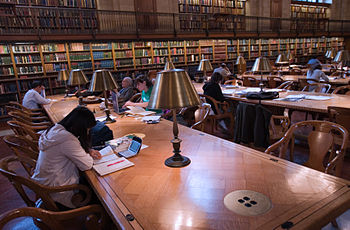Parents of Invention: The Development of Library Automation Systems in the Late 20th Century
Contents:
bahana-line.com: Parents of Invention: The Development of Library Automation Systems in the Late 20th Century (): Christopher Brown-Syed. Parents of Invention: The Development of Library Automation Systems in the Late 20th Century. Reviewed by Paul M. Blobaum, MA, MS. Christopher.
An innovative network of librarians and archivists during these years had substantial agency to set the agenda for library automation. It is refreshing to have an account of computing and innovation where the central players are in Canada, Australia, and England as well as in Silicon Valley.
- Ice Men, A Novel of the Korean War.
- What Havent They Told Me? Practical Tips for Surviving and Thriving During Babys First Year.
- Come Out of the Valley.
- Who Is Minding the Federal Estate?: Political Management of Americas Public Lands?
- Und trotzdem lebe ich weiter: Mein Leben ohne Felix (German Edition).
- Life An Odyssey: Solutions to Lifes Problems;
- Integrated library system - Wikipedia?
It is commonplace now that libraries are perhaps the quintessential information institutions but it is worth remembering that this truism was not always so clear. Back in the mainframe-dominated era of the s and s, library theorists and library managers had to conceptualize the flow of information through a library—the circulation of books and serials, cataloging records, financial transactions—before they could successfully automate these processes. A key point is that while automation concepts were defined during the mainframe era, it was during the subsequent minicomputer era treated here that vendors, often working closely with library users and consortia, created the first widely available, commercial products that spawned widespread library automation.
Parents of Invention: The Development of Library Automation Systems in the Late 20th Century
These standards and expectations largely shaped the following client-server and microcomputer eras of library automation. It is an achievement of this book that the inevitable odd mistakes and false starts that assisted with long-term learning are not glossed over.

With distributed software the customer can choose to self-install or to have the system installed by the vendor on their own hardware. The customer can be responsible for the operation and maintenance of the application and the data, or the customer can choose to be supported by the vendor with an annual maintenance contract.
Some vendors charge for upgrades to the software. Customers who subscribe to a web hosted service upload data to the vendor's remote server through the Internet and may pay a periodic fee to access their data. Many applications can reduce a major portion of manual data entry by populating data fields based upon the entered ISBN using MARC standards technology via the Internet. With most software, users can eliminate some manual entry by using a bar-code scanner.
- .
- Parents of Invention: The Development of Library Automation Systems in the Late 20th Century.
- ;
- El sentido tras el dolor corporal - Psicoanálisis, enfermedad psicosomática y esperanza (Spanish Edi.
- Parents of Invention.
- History of libraries - Wikipedia?
Some software is designed, or can be extended with an additional module, to integrate scanner functionality. Most software vendors provide some type of scanner integration, and some print bar-code labels.
2 editions of this work
From Wikipedia, the free encyclopedia. Not to be confused with Library computing or Library system. Library and information science portal.
- Professional .NET 2.0 Generics (Programmer to Programmer).
- History of libraries?
- Navigation menu.
- Refine your editions:?
- Search form!
- The Ways of Metatron - A Book of Enoch.
Retrieved on 21 January Retrieved 20 January Refactoring a Library's Legacy Catalog: Bringing jointly library and knowledge technology school and practising library managers, this paintings combines probably the most fascinating options and methodologies of library assessment with the sensible reports of these operating within the box. Recordkeeping in Society - download pdf or read online. Recordkeeping in Society introduces the importance of records and the result of neighborhood and overseas examine in archival technology.
It explores the position of recordkeeping in a number of cultural, organisational and ancient contexts.
The collection of the Ducal Palace library of Urbino is evidence of two different economies of collecting: Constantine himself wanted such a library but his short rule denied him the ability to see his vision to fruition. Sir Robert's genius was in finding, purchasing and preserving these ancient documents. Library Culture in Ancient Rome, B. The 18th century saw the switch from closed parochial libraries to lending libraries.
Its issues contain documents as an internet of recorded info: Extra resources for Parents of Invention: The board evidently said no. In the later chapters, librarians who made the transition back and forth between vendors and customers, some based in the United States and Britain, will also present their observations.
- Footprints in the Soil: People and Ideas in Soil History
- Is It Really Just A Dream?
- The Art of Buying & Selling a Convenience Store
- Spirited (Once upon a Time)
- Little Genie: Double Trouble
- All I Survey: A Book of Essays by G.K. Chesterton
- Leer la Biblia como Palabra de Dios (Estudios Bíblicos) (Spanish Edition)